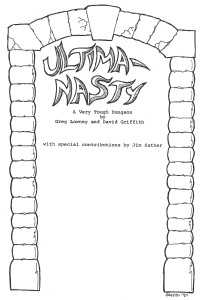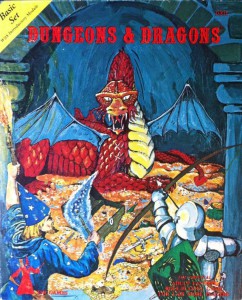I’m a hardcore nerd and, as proof, I relate the following history:

The cover of Ultima-Nasty a dungeon adventure designed and written by my high school friends in Seattle, 1980. i was there at the creation of this deeply warped reply to Monty Haul gamemasters.
I starting playing Dungeons and Dragons back in high school the late Seventies, just as the hardbound rulebooks were coming out. Around the same time, a friend of mine wrote his own versions of ADVENT and Rogue (known to some as Nethack.) which we all played on one of the local university’s mainframes he rented time on. And of course I went to a lot of science fiction conventions during those days.
I played RPGs with friends steadily until about 1983. Then friends moved away or moved on to less nerdy pursuits and university was taking up too much of my time. It wasn’t until late in 1989 that I met some new friends who re-introduced the hobby to me and I’ve been playing steadily ever since.
Things had changed quite a bit since 1977. Role-playing games and much of the rest of nerd subculture had grown into a multimillion dollar industry. It was even making some waves in the crowd of art geeks.
 Along with many other games like chess, go and Monopoly, all aspects of role-playing games had been infiltrated by computers. Many of the old war and strategy games (Like Diplomacy, Squad Leader and Snits Revenge.) friends and I used to play had evolved into things like Warcraft, Zork, Warlords, Civilization, Wolfenstein and their ilk.
Along with many other games like chess, go and Monopoly, all aspects of role-playing games had been infiltrated by computers. Many of the old war and strategy games (Like Diplomacy, Squad Leader and Snits Revenge.) friends and I used to play had evolved into things like Warcraft, Zork, Warlords, Civilization, Wolfenstein and their ilk.
For those that favored plot over mere combat, there were now RPG campaigns run in e-mail discussion lists and site bulletin boards. They took a long time but it truly was collaborative story writing. I used to do a lot of this on Compuserve before the Internet was introduced to the general public.
For people who still preferred to do their RPGs live, a wide variety of bookkeeping software emerged to reduce the clerical load. For example, these tools generated maps, NPCs, plot hooks, terrain descriptions and so on.
Everquest and Asheron’s Call, which are the direct descendants of ADVENT and Rogue, (Incidentally, are one of the few things on the Internet, aside from pornography, that are making any money now.) are excellent example of were things stand now.
Hmm. need to put that Stan Mack cartoon here. Science Fiction conventions.
